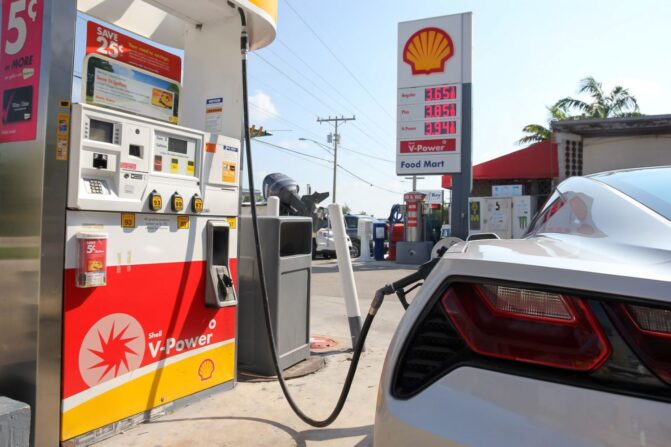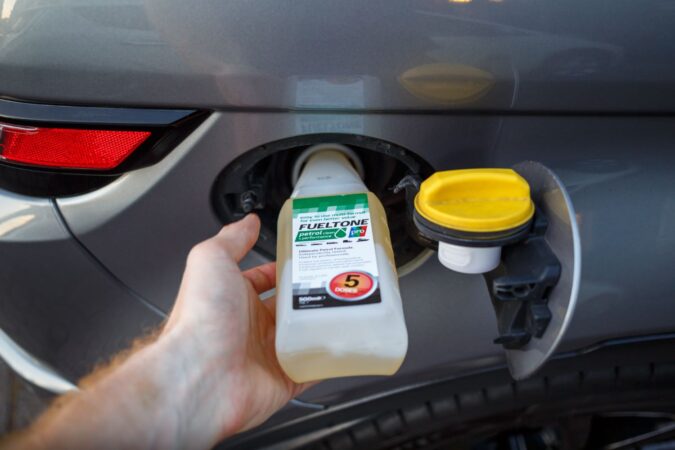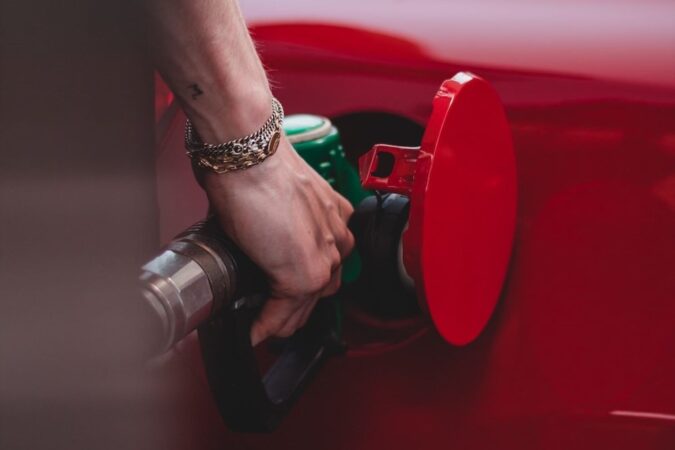There’s a common misconception that Top Tier gas, as a myth, was concocted by Big Oil to get people to pay more for gasoline. Given how fuel prices, cost of living, and economic recession have gotten far out of hand, do you really need to stick to Top Tier gas? Or, is it just as safe to go for lower-priced, non-Top Tier gasoline? In practice, however, it’s not as clear-cut.
Top Tier gas is actually healthier for your car than low-cost gas at your local fuel station. The reason is that Top Tier gasoline contains additives that help your engine run longer, cleaner, and better than lower-priced gas. Therefore, the myth that Top Tier gas is a scam is not entirely correct. While it is more expensive, it does have actual advantages.
However, while there are tangible benefits, is it really worth the premium over cheaper gas, just to get those extra detergent additives? Well, it might just be worthwhile, given that Top Tier gas has the ability to reduce carbon deposits using those special detergents. Here’s a deeper look at this specially manufactured and treated fuel to reduce carbon deposits…
What Is Top Tier Gas?
By comparison, regular, standard gasoline is refined crude oil transported from the refinery to several terminals for storage and sale. Normal fuel contains antioxidants and some detergents, just like Top Tier gas. However, the difference is that Top Tier gasoline has additional antioxidants and specialty detergents. As such, it’s supplemented with proper additives.
These additional additives are what separates Top Tier gas from regular, and even premium gasoline. It has to meet strict requirements, and gas stations that sell Top Tier gas must display a special sign. It’s vital to note, however, that a car doesn’t require Top Tier gas to run. All it does is make your car run better, with fewer emissions, and better MPGs.
For you, this may or may not matter. Plus, the added cost of pricier Top Tier gas is up to you; since it’s not necessary. For automakers, they do see benefits in their cars running on Top Tier gas. This is why in 1996, the EPA regulated detergents that were used in gasoline. This is all done to regulate the level of carbon deposits in vehicles. Carmakers then followed suit.
‘Top Tier’ thus became a colossal brand and trademark, separating regular gas from higher-quality fuel (including gasoline and diesel), which were optimized for improved performance, fuel efficiency, and engine lifespan. Automakers that supported the Top Tier standard include BMW, General Motors, Honda, Mercedes-Benz, Toyota, and Audi, among others.
Is Top Tier Gas Really Worth It?
Despite the higher price per gallon associated with Top Tier gas, and the myth around it, it’s definitely worth the hype. A lab test result of Top Tier gasoline, when compared to regular gas, showed that after 4,000 miles of simulated driving, the Top Tier gasoline left fewer carbon deposits on the fuel injectors, combustion components, and intake valves.
Carbon deposits, in particular, had an almost 72% reduction in comparison to regular gasoline. Remember, Top Tier gas is not the same as premium gas. In contrast, premium gas means it met a minimum octane rating. But, that doesn’t mean premium gas is of higher quality. In the case of Top Tier gas, it not only has to meet those same minimum octane ratings…
But, Top Tier gas also has to exceed the additive standards applicable to gasoline and diesel set by the EPA. While it might not showcase early on, carbon deposits, over the long run, can cause performance issues. And, even cause added wear and tear to your car’s engine. In short, Top Tier gas ensures that your car runs longer, smoother, and cleaner.
Those detergent additives in Top Tier gas basically increase the rate at which impurities are burnt out in your car’s engine. First coming to light back in 2004, the NHTSA also recommends using Top Tier gasoline and diesel. They confirm that it does, in fact, have excellent carbon deposit reduction capabilities. However, is Top Tier gas or diesel worth the price?
What’s The Myth Around Top Tier Gas?
There’s a common myth, claiming that Top Tier gas is basically the same as regular, lower-priced gasoline (or diesel). But, with fancy branding on it just to jack up the price of fuel. Because of how widespread this myth is, the concept that it’s a scam just to give Big Auto and Big Oil more money means that most car owners generally don’t bother with Top Tier gas.
However, as we noted earlier, Top Tier gas isn’t a scam, and it genuinely is better than regular, lower-priced gasoline. Among other benefits, Top Tier gas contains a higher level of detergent additives than regular gas (or diesel). Subsequently, Top Tier gas helps to reduce carbon deposits in your engine, helping to optimize performance and fuel efficiency.
To be clear though, it’s not like Top Tier gas is a necessity. There’s no problem with using lower-priced gas, and it won’t cause issues with your car. In particular, if you practice good maintenance. And, drop in a bottle of fuel cleaner every once in a while, they can help with removing carbon deposits. And, fuel cleaners offer the same benefits as Top Tier gas.
Just like Top Tier gas or diesel, fuel cleaners aid in optimizing engine performance, and longevity, and help to maximize fuel economy. Plus, a bottle of fuel cleaner costs just $10 to $15. Still, if you can afford to fill up your car with Top Tier gas or diesel, it’s one alternative way of practicing long-term, preventative maintenance. In short, it’s worth it, but not 100% needed.
Does Your Car Need Top Tier Gas?
No, it doesn’t. As we mentioned earlier, Top Tier gas or diesel is not a requirement for your car. But, the quality of the fuel is better and it does have benefits for your car. Even after thousands of miles of driving, the EPA has proven that Top Tier gasoline and diesel improve performance, fuel economy, and even slightly lower emissions.
As such, Top Tier is an optional recommendation for better running your vehicle, not a requirement. Another thing that most folks are confused about is whether or not Top Tier gas is the same as premium gas. The key difference here is that while Top Tier gas isn’t a requirement, premium gas is recommended. Particularly, if your specific car demands premium.
They’re both higher-quality gas and diesel. Both Top Tier and premium fuels are expensive and are always a car owner’s last choice if they’re on a budget. However, premium gas (or diesel) doesn’t really have noticeable improvements aside from its higher octane ratings (if your car doesn’t need it). On the other hand, Top Tier gas has those additional detergent additives.
Which Gas Stations Offer Top Tier Gasoline & Diesel?
Many, but not all, gas stations are licensed retailers that offer fuel that meets Top Tier standards. To be sure, look out for the Top Tier logo or sign at the gas station. Some of the requirements that a gas station needs to comply with before selling Top Tier gasoline or diesel include:
- They must have a specific license, proving that they’re part of the Top Tier program.
- Treatment of the gasoline or diesel must be using an approved Top Tier detergent additive and at the proper concentration.
- They must display the Top Tier logo or sign broadly and prominently at the gas station.
- There should be no organometallic additives of any kind in the gasoline or diesel.
Some of the more prominent gas station franchises that offer Top Tier gasoline and diesel include… Arco, Beacon, Aloha Petroleum, Citgo, CountryMark, Shamrock, Chevron, Conoco, Cenex, Diamond, Exxon, GetGo, Express Mart, and Fast Fue. Then, there’s HFN, Hele, Kwik Trip, Fuel Stop, Marathon, Metro, Kwik Star, Petro, Ohana Fuels, QT/Quik, Ranger, Shamrock, Sinclair, Value America, Shell, Moil, Philips, Rutter’s, Simonson, Texaco, and Wawa. These are just some examples.




“The fuel octane rating determines the stability of the gas.”
No, it does not. It’s the anti-knock rating. The octane rating determines the fuel’s resistance to ignition in order to prevent premature ignition of unburned vapors: AKA “Knock”.
The only problem is there is no way of knowing if the “approved additives” were actually added to the gasoline you are buying. I would stick with an annual treatment of Seafoam.
Like Brett, I understand there is a lot of hanky-panky and dishonesty in fuel retailing, tank filling in darkness, and poor regulation of ethanol percentage. Finding a high-volume station with clean tanks and staying with it is the best policy for good value, whatever the brand or rating. Also noteworthy: used cars are not advertised or priced for whatever kind of fuel and oil a previous owner or leasee might have put in the tank and used.
I completely agree with you, Wadhamite. The fuel retailing industry can indeed be plagued with dishonest practices and poor regulation, making it difficult for consumers to determine which gas station truly offers the best fuel. It’s unfortunate that there is hanky-panky involved, such as tank filling in darkness, which further adds to the uncertainty.
Your suggestion of finding a high-volume station with clean tanks and sticking to it is a practical approach to ensure good value, regardless of the brand or rating. It’s crucial to prioritize stations that maintain their tanks well, as dirty tanks can potentially contaminate the fuel and impact its quality.
Additionally, your point about used cars is worth noting. When purchasing a pre-owned vehicle, it’s essential to be mindful that the previous owner or leasee might have used different types of fuel and oil, which can influence the overall condition of the vehicle. This is something that is often overlooked and not explicitly advertised or priced.
In summary, navigating the world of fuel retailing can be challenging, but by prioritizing stations with clean tanks and being aware of the potential impact on used cars, we can make more informed decisions when it comes to fueling our vehicles.
Octane rating measures a fuel’s resistance to knocking, which is the premature ignition of fuel in the engine. Higher octane fuels are more resistant to knocking, which is important for high-performance and high-compression engines. However, octane rating is not related to the stability of the fuel in terms of its chemical composition or its ability to resist degradation over time.
Fuel stability typically refers to the fuel’s ability to resist oxidation and other chemical changes that can occur over time, leading to the formation of deposits, gum, and varnish in the fuel system. Fuel stability is influenced by factors such as the presence of additives, exposure to air, temperature, and the presence of impurities. Octane rating does not directly indicate the stability of the fuel.
How do I know that the gas I’m pumping has the extra additives in it or not as I’m only seeing what the pump states. A fuel wholesaler neat me distributes Marathon,BP, Citgo and Phillips 66. How do I know what fuel is coming from each station as I’m sure they are coming from the same rack?
Hi Lee,
It can be challenging to determine the specific additives in the gasoline you’re pumping from a particular station because, as you mentioned, multiple brands may be sourced from the same fuel distributor’s rack. Gasoline is typically regulated by government standards to meet certain minimum requirements for performance, so it should generally adhere to those standards regardless of the brand.
To gain a better understanding of the additives or detergents in the gasoline you’re buying, you can consider the following options:
1. Contact the gas station: You can try reaching out to the gas station directly and inquire about the additives or detergents they use in their fuel. They may be able to provide you with some information about their specific gasoline blend.
2. Check the station’s website or contact customer support: Some gas stations may provide information about their fuel additives and quality standards on their official website. You can also try contacting their customer support for more details.
3. Research online: Online resources, forums, and websites dedicated to discussing gasoline quality and additives may have information or reviews about specific gas stations and their fuel quality. You can search for reviews or discussions on the brands you’re interested in.
4. Look for certification labels: Some gasoline brands may have certification labels on their pumps or at the station indicating that their fuel meets certain industry standards or contains specific additives. Look for these labels to get an idea of the fuel’s quality.
5. Trust established brands: Established gasoline brands like Marathon, BP, Citgo, and Phillips 66 generally have a reputation to uphold, and they often invest in additives and detergents to maintain their quality. So, choosing a well-known brand can provide a level of assurance regarding the fuel quality.
Ultimately, while it may be challenging to know the precise additives in the gasoline you’re purchasing, choosing a reputable brand with a good track record and following any available guidelines or certification labels can help ensure that you’re getting a reliable and quality fuel product.